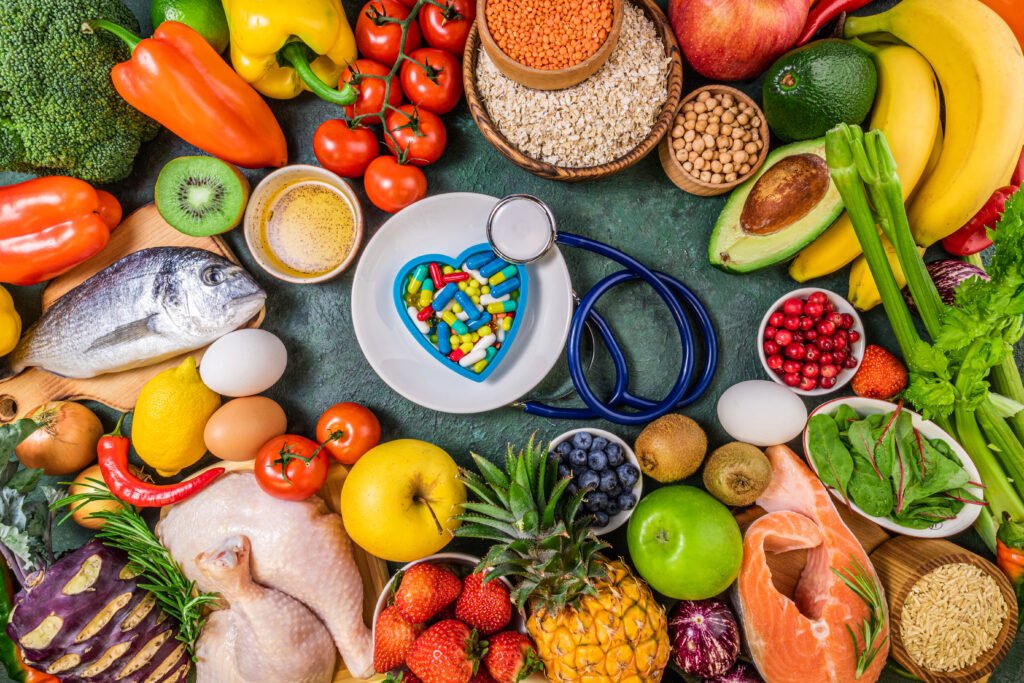In the world of endurance sports, nutrition plays a pivotal role that is often underestimated by aspiring athletes. To succeed in long-distance running, it’s essential to understand the significance of proper nutrition and fuel management. The right nutrition strategy not only prepares your body for the grueling demands of endurance but also enhances performance, stamina, and recovery. This blog post will guide you through the critical aspects of nutrition planning, helping you transform your endurance game by unlocking the full power of nutrition to fuel your body for long-distance success.
Nutrition and Fuelling Plans for Long-Distance Running
| Nutrient | Role in Performance | Sources | Timing/Usage | Key Considerations |
|---|---|---|---|---|
| Carbohydrates | Primary energy source | Whole grains, fruits, vegetables | Consume before and during race for sustained energy | Avoid excessive intake before bed to prevent bloating |
| Proteins | Muscle repair and recovery | Lean meats, legumes, dairy, plant-based sources | Include post-race for muscle recovery | Aim for balanced intake across meals |
| Fats | Sustained energy, especially for prolonged efforts | Avocados, nuts, seeds, olive oil | Incorporate in meals throughout the day | Ensure fats are healthy and not too high in saturated fats |
| Hydration | Prevents dehydration, supports body functions | Water, electrolyte drinks | Hydrate consistently before, during, and after the race | Adjust based on weather and sweat rate |
For any long-distance runner dedicated to optimizing their performance, proper nutrition and fueling strategies are indispensable. Maintaining a fine-tuned balance of carbohydrates, proteins, and fats ensures that you have sustained energy levels and can efficiently recover muscles. Carbohydrates, in particular, act as the body’s primary energy source and are essential for maintaining endurance levels. Proteins aid in muscle repair, while healthy fats provide a long-term energy reservoir necessary for prolonged efforts. Furthermore, the timing of nutritional intake must be well-planned, including strategic consumption of pre-race meals and mid-race fuels, which is essential for maintaining stamina over long distances. Staying hydrated is also a critical element during runs, as it prevents fatigue and supports overall physical function. By tailoring a personalized nutrition plan that considers individual dietary preferences and tolerances, athletes can significantly enhance their endurance and performance.
Key Considerations for Nutrition Plans:
– Carbohydrates should comprise a significant part of your diet for energy.
– Include protein-rich foods to facilitate muscle repair and strength.
– Don’t forget healthy fats for sustained energy release.
– Plan your pre-race and mid-race meals to maintain energy and stamina.
– Personalize your nutrition strategies to suit your body’s needs and preferences.
What Shouldn’t I Eat Before Running?
| Food Type | Reason to Avoid | Impact on Performance |
|---|---|---|
| High-Fat Foods | Slows digestion | Can cause stomach discomfort, reduces energy efficiency |
| Fibrous Foods | Can lead to bloating | May cause digestive issues and cramps |
| Sugary Snacks | Causes blood sugar spikes and crashes | Energy crash mid-run, leading to sluggishness |
| Large Meals | Increases the likelihood of cramps | Can make you feel weighed down and sluggish |
| Dairy Products | Potential for stomach discomfort | May upset stomach and decrease performance |
When gearing up for a long-distance run, it’s as crucial to know what to avoid as it is to know what to consume. Eating the wrong foods before running can lead to discomfort, sluggishness, or even gastrointestinal issues, negatively impacting your performance. High-fat foods are a primary culprit, as they slow digestion and can cause stomach discomfort during your activity. Similarly, fibrous foods like beans and certain vegetables are best avoided due to their potential to cause bloating and digestive issues. Sugary, processed snacks may initially seem appealing, but they can lead to an energy crash mid-run, diminishing performance. Consuming large meals immediately before running is also a mistake, as it increases the likelihood of cramps and feeling weighed down. Lastly, consuming dairy products should be minimized as they might trigger stomach discomfort, affecting your overall running efficiency.
Foods to Avoid:
– High-fat foods that slow digestion.
– Fibrous foods which might cause bloating.
– Sugary snacks prone to causing energy crashes.
– Large meals that provoke sluggishness.
– Dairy products that may upset your stomach.
What Are Complex Carbohydrates?
| Source | Type | Nutrient Content | Benefits for Endurance |
|---|---|---|---|
| Whole Grains | Complex Carb | Rich in fiber, B vitamins | Steady energy release, supports muscle glycogen storage |
| Legumes | Complex Carb | High in protein, fiber | Sustained energy, aids muscle repair during long efforts |
| Vegetables | Complex Carb | High in vitamins, antioxidants | Essential for recovery, reduces inflammation |
| Fruits | Simple and Complex Carb | High in vitamins and sugars | Quick energy and overall health benefits |
| Oats | Complex Carb | High in fiber, slow-releasing | Provides long-lasting energy and stable blood sugar levels |
Complex carbohydrates form a cornerstone of an efficient diet for endurance athletes, providing a steady and sustained energy release. Composed of longer chains of sugar molecules, they are digested more slowly compared to simple carbohydrates, thereby avoiding abrupt energy dips. Sources of complex carbohydrates include whole grains, legumes, vegetables, and some fruits, all of which are not only energy-rich but also contribute significantly to overall health due to their nutrient density. Incorporating them into your meals enhances glycogen storage in muscles, which is vital for prolonged physical exertion. To optimize your performance and recovery in endurance sports, it’s imperative to balance complex carbohydrates with proteins and healthy fats, thereby ensuring a comprehensive nutritional profile.
Sources of Complex Carbohydrates:
– Whole grains such as brown rice, quinoa, and oats.
– Legumes including lentils and chickpeas.
– Vegetables like sweet potatoes and carrots.
– Fruits such as bananas and apples.
– A balanced mix with proteins and fats for optimal results.
What Are Simple Carbohydrates?
| Source | Type | Nutrient Content | Role in Endurance |
|---|---|---|---|
| Fruits (e.g., bananas, oranges) | Simple Carb | Natural sugars, fiber | Provides quick energy, replenishes glycogen stores |
| Dairy (e.g., milk, yogurt) | Simple Carb | Lactose, calcium | Quick energy, supports muscle recovery |
| Honey | Simple Carb | Natural sugars, antioxidants | Fast-acting energy boost, replenishes glycogen |
| Baked Goods (lightly processed) | Simple Carb | Refined sugar, small fiber | Quick energy for intense physical activity |
Simple carbohydrates offer a quick burst of energy, making them an effective fuel source for immediate consumption before or during endurance activities. They predominantly consist of quickly digestible sugars found in foods like fruits, dairy products, honey, and certain baked goods. Unlike complex carbohydrates, simple carbohydrates are absorbed quicker, making them ideal for preventing energy lags during intense exercise. Nevertheless, it’s crucial to balance them with other nutrients to prevent potential energy crashes and sustain performance. Simple carbs deliver immediate glycogen replenishment, but pairing them with proteins and fats helps manage the rate of absorption, optimizing endurance and energy levels in long-distance sports.
Fast-Acting Fuel Sources:
– Fruits such as oranges and grapes.
– Dairy products like milk and yogurt.
– Honey as a natural sweetener.
– Lightly processed baked goods for quick energy.
– Combine with proteins and fats to maintain stable energy.
What Are Macronutrients?
| Macronutrient | Function | Primary Sources | Recommended Intake |
|---|---|---|---|
| Carbohydrates | Provides quick energy, sustains endurance | Whole grains, fruits, vegetables | 50-60% of total daily intake |
| Proteins | Muscle repair, supports recovery | Lean meats, legumes, dairy | 10-20% of total daily intake |
| Fats | Long-term energy, supports stamina | Avocados, nuts, seeds, olive oil | 20-30% of total daily intake |
Macronutrients are the trio of essential nutrients needed in larger amounts to provide energy and support vital bodily functions, notably in endurance activities. Comprising carbohydrates, proteins, and fats, each macronutrient plays a pivotal role in fuel provision and energy maintenance. Carbohydrates serve as the main source of energy, offering swift and efficient energy release vital for endurance athletes. Proteins are indispensable for muscle repair and recovery, aiding in the maintenance of muscle mass and promoting overall endurance performance. Fats, being highly energy-dense, function as a reliable source of sustained energy, especially when carbohydrate stores are low, supporting longer-duration activities.
Core Macronutrient Functions:
– Carbohydrates: The main energy source.
– Proteins: Essential for muscle repair and recovery.
– Fats: Provide sustained energy for prolonged efforts.
– Ensure a balanced intake for optimal performance.
– Adjust macro ratios to individual energy and recovery needs.
Is Caffeine a Good Idea Before Running?

Caffeine is often considered a beneficial supplement for enhancing endurance performance due to its potential to increase alertness and reduce perceived effort. Consuming caffeine before a run can help improve stamina, enabling athletes to maintain a faster pace while delaying fatigue onset. Furthermore, caffeine aids in mobilizing fat stores, adding an additional energy source and sparing muscle glycogen for more prolonged energy availability. However, effectively harnessing the boosts of caffeine relies significantly on the timing and dosage of its consumption, as too much can lead to jitters or gastrointestinal discomfort. Ultimately, athletes should tailor their caffeine intake to their individual tolerance through trial and error during training, ensuring maximum benefit with minimal side effects.
Tips for Effective Caffeine Use:
– Consider caffeine for increased alertness and reduced effort.
– Use it to aid fat mobilization and extend glycogen usage.
– Be cautious of timing and dosage to avert side effects.
– Experiment during training to find the optimal personal intake.
– Monitor personal reactions to adapt caffeine consumption accordingly.
How Much Water Should I Drink Before and During a Race?
| Timing | Amount | Type of Drink | Purpose |
|---|---|---|---|
| 2-3 hours before race | 16-20 ounces | Water | Ensures hydration before the race |
| 20 minutes before race | 8-12 ounces | Water or sports drink | Prepares body for exertion |
| During the race | 4-6 ounces every 20 minutes | Water or electrolyte drink | Replaces lost fluids and electrolytes |
| Post-race | 16-24 ounces for each pound lost | Water or electrolyte drink | Replenish fluids lost during exercise |
Hydration strategy is imperative when preparing for and executing long-distance runs. Pre-race hydration begins well in advance, targeting the consumption of 16-20 ounces of water 2-3 hours prior to the starting time to ensure you start fully hydrated. Just before the race, in the 20 minutes leading up, it’s wise to consume an additional 8-12 ounces. During the race, aim to drink around 4-6 ounces of water every 20 minutes, although this should be adjusted based on personal sweat rates and varying weather conditions. For races exceeding an hour, incorporating electrolyte drinks can prove beneficial to replace lost salts and maintain a healthy electrolyte balance. Always listen to your body’s thirst signals to avoid both dehydration and overhydration, each of which can deteriorate performance.
Hydration Guidelines:
– Start with 16-20 ounces, 2-3 hours before racing.
– Hydrate with an additional 8-12 ounces right before starting.
– Consume 4-6 ounces every 20 minutes during your run.
– Use electrolyte drinks for extended races to balance lost salts.
– Pay attention to thirst cues to maintain optimal hydration.
What Are the Key Nutrients Essential for Enhancing Endurance During Long-Distance Activities?

A well-rounded diet is paramount for athletes looking to bolster endurance during long-distance activities. Carbohydrates top the nutrient hierarchy by providing glycogen, the primary fuel source necessary for sustaining energy levels during prolonged activities. Proteins follow closely, assisting in muscle repair and recovery, thereby crucial in maintaining endurance performance over extensive distances. Healthy fats contribute significantly to a steady, long-term energy supply, particularly pivotal in low-intensity endurance activities. Electrolytes, like sodium, potassium, and magnesium, prove essential in maintaining hydration levels and preventing cramps. Vitamins and minerals, including C and E, also play a supportive role in reducing oxidative stress, promoting overall endurance.
Essential Endurance Boosters:
– Carbohydrates for glycogen and energy.
– Proteins for recovery and muscle maintenance.
– Fats for steady, ongoing energy supply.
– Electrolytes to sustain hydration and prevent cramps.
– Vital vitamins and minerals for enhanced stamina.
How Does Proper Nutrition Impact Performance in Endurance Sports?
| Nutrition Factor | Impact on Performance | How to Optimize |
|---|---|---|
| Carbohydrates | Provides sustained energy, prevents fatigue | Prioritize before and during long-distance events |
| Proteins | Supports muscle recovery, reduces soreness | Consume post-exercise for muscle repair |
| Fats | Offers prolonged energy supply | Include healthy fats for endurance support |
| Hydration | Regulates body temperature, prevents dehydration | Maintain consistent water intake pre, during, and post-race |
| Vitamins and Minerals | Reduces oxidative stress, supports immune function | Incorporate a variety of fruits and vegetables into daily meals |
The impact of proper nutrition on endurance sports performance cannot be overstated; it sets the foundation for a robust energy reserve, allowing athletes to maintain their stamina throughout endurance events. Adequate consumption of carbohydrates, proteins, and fats aids significantly in muscle recovery and minimizes fatigue, safeguarding endurance athletes from performance drops. Hydration also holds critical importance by helping regulate body temperature and preventing dehydration, which could otherwise lead to rapid declines in performance. Consuming the right nutrients before, during, and after exercise further enhances metabolic efficiency, culminating in optimized overall performance in endurance sports. Balanced nutrition acts as a fortress for the immune system too, helping athletes stay healthy and fend off illness or injury during intensive training and competition periods.
Critical Nutrition Impact Points:
– Builds energy reserves for sustaining stamina.
– Supports effective muscle recovery and fatigue reduction.
– Hydration maintains body temperature and prevents dehydration.
– Enhances metabolic efficiency and overall performance.
– Fortifies immune health to avoid training disruptions.
What Should a Typical Meal Plan Look Like for Someone Training for a Long-Distance Event?

A balanced and strategic meal plan is essential for athletes in training for long-distance events, emphasizing a harmonious macronutrient intake. Carbohydrates are prioritized for energy, with proteins supporting muscle repair, and fats providing sustained stamina. Incorporating whole grains, lean proteins, healthy fats, fruits, and vegetables ensures athletes receive essential vitamins and minerals. Meal timing is also vital; consuming a carbohydrate-rich meal 3-4 hours before training maximizes performance potential. Maintaining hydration through consistent water intake and electrolyte-rich fluids supports energy levels and recovery. Including quick-energy snacks, like nuts, fruits, or yogurt, particularly during long training sessions, can provide necessary energy boosts.
Building an Ideal Meal Plan:
– Prioritize carbohydrates for energy and proteins for muscle repair.
– Incorporate healthy fats for ongoing energy release.
– Use whole grains, fruits, vegetables, and lean proteins for nutrients.
– Time meals strategically before training sessions.
– Stay hydrated consistently along with electrolyte replenishment.
How Can I Effectively Hydrate Before, During, and After a Long-Distance Workout?
An effective hydration strategy encompasses all stages of a long-distance workout, ensuring the body remains adequately hydrated and ready for peak performance. Pre-workout hydration is critical, targeting at least 16-20 ounces of water or sports drinks 2-3 hours before starting to prime the body. It’s also crucial to maintain fluid intake during exercise, aiming for 5-10 ounces of water or sports drinks every 15-20 minutes to sustain hydration levels. Utilizing electrolyte-rich drinks can replenish essential minerals, such as sodium and potassium, that are lost through sweat, helping to maintain electrolyte balance. Monitoring urine color serves as a practical hydration indicator, with light yellow typically indicating sufficient hydration. Post-workout, consume 16-24 ounces of fluid for each pound lost during the exercise to restore the body’s water balance.
Hydration Strategies:
– Pre-workout: Drink 16-20 ounces hours before the workout.
– During workout: Maintain 5-10 ounces every 15-20 minutes.
– Introduce electrolyte drinks for electrolyte balance.
– Monitor urine color to guide hydration adequacy.
– Post-exercise: Replenish fluid losses with exact intake.
Are There Specific Foods or Supplements That Can Help Improve Stamina for Endurance Sports?

Nutrition for endurance sports extends into specific foods and supplements specially touted for their stamina-boosting properties. Complex carbohydrates such as whole grains and oats are essential for sustained energy release over long distances. Proteins from sources like lean meats and plant-based options aid muscle repair, essential for maintaining endurance capabilities. Healthy fats found in avocados and nuts support long-term energy maintenance, perfect for prolonged physical activity. Key supplements like caffeine, beetroot juice, and Branched-Chain Amino Acids (BCAAs) could offer performance enhancements and delay fatigue. Hydration, particularly through electrolyte drinks or foods, is also fundamental for sustained endurance.
Enhancing Stamina Through Diet:
– Consume complex carbohydrates for sustained energy.
– Use proteins to bolster muscle repair and endurance.
– Rely on fats for prolonged energy during lengthy exercise.
– Supplements such as caffeine and BCAAs to enhance performance.
– Hydration through electrolyte balance for optimal endurance.
Fueling Long-Distance Success Through Nutrition
Proper nutrition acts as both the fuel and catalyst for long-distance success. A well-crafted nutrition and hydration strategy addresses the specific energy demands of endurance sports, paving the path for peak performance. By emphasizing the right balance of carbohydrates, proteins, and fats, athletes can ensure sustained energy, swift recovery, and optimal endurance. Avoiding certain foods, timing meals effectively, and incorporating the right nutrients at the right times can make a monumental difference in overall athletic performance. Embracing individual preferences and tolerances, a personalized nutrition plan not only enhances endurance capabilities but also promotes overall health and vitality. As you strive for long-distance success, remember that the power of nutrition is fundamental, a true game-changer in your endurance pursuits.













